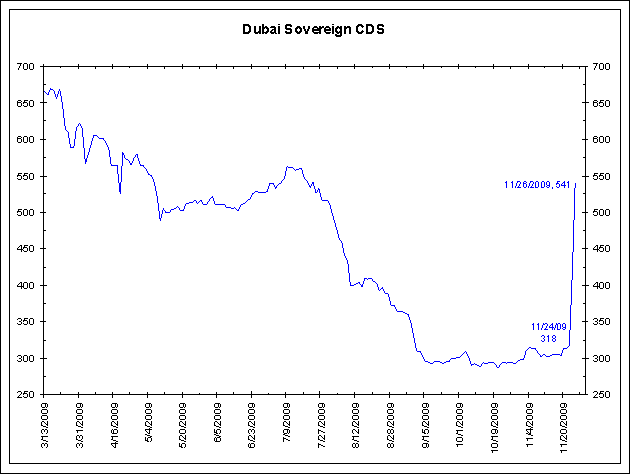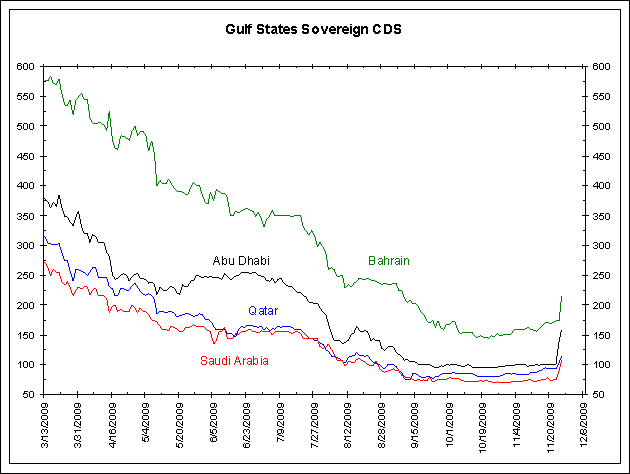Dubai – The First Credit Crisis Since The March Market Recovery
Comment
As the first chart shows, Dubai’s sovereign credit default swaps (CDS) are soaring in the wake of the news that Dubai World wants a standstill agreement on roughly $60 billion of debt. Even though Dubai World is a corporation seeking the agreement, the markets are clearly treating this as a sovereign debt issue.
As the second chart shows, this is causing a “contagion” among the credit worthiness of other gulf soverign debt.
<Click on chart for larger image>
<Click on chart for larger image>
Comment
It appears this is the first credit crisis since financial markets began their recovery. So while many are trying to dissect the particulars of this case (Dubai gets its money from Abu Dhabi who will eventually bail them out), they are missing the larger issue. As we have been arguing for months, markets have been rallying non-stop on the back of cheap money. This carry trade has led to many bubbles in the markets. A solvency issue causes the dollar to rally (not good for the carry trade) and investors to “blink” from risk markets. This is not good when financing your entire position at 0%.
This is more about the timing of the issue than the issue itself.
- The New York Times – Dubai’s Investment Troubles Leave Markets Unsteady
European markets calmed Friday after falling more than 3 percent the day before when investors were spooked by news that Dubai World, the emirate’s investment vehicle, was seeking to suspend repayments on all or part of its $59 billion in debt. In late afternoon trading, the FTSE 100 in London was up 12 points, or 0.25 percent, while the DAX in Frankfurt rose 19 points or 0.5 percent. In Paris, the CAC 40 was 18 points or 0.5 percent higher. Wall Street, however, is expected to open sharply lower as investors try to play catch up with the Dubai report. American markets will be open for a half-day after being closed Thursday for Thanksgiving. - The Wall Street Journal – Pressure Mounts on Abu Dhabi
Pressure mounted on oil-rich Abu Dhabi to step in with financial support for Dubai after fears of a debt default by one of its state-owned conglomerates hit stock markets in Asia and Europe. The U.A.E. is a federation of seven sheikdoms including Abu Dhabi and Dubai. Abu Dhabi is the senior partner in the grouping and controls 90% of its vast oil reserves, considered to by the world’s fifth largest. “Abu Dhabi’s support for Dubai might be less generous than the markets have assumed so far. Perhaps Abu Dhabi has forced Dubai to tackle the problem of excessive corporate debt ‘in-house’ first before extending more financial support,” Swiss lender UBS AG said in a research note. - The Financial Times – Lex: Dubai World
Argentina’s default in 2001 didn’t come out of the blue. Nor did Lehman’s collapse. Yet both caused shockwaves. Now it may be Dubai’s turn. Investors fear that a debt standstill by Dubai World, the city kingdom’s largest state-owned conglomerate, is a prelude to a forced restructuring of its estimated $60bn of liabilities. This has caused a repricing of risk both in and beyond the Gulf. Bank share prices took a pummelling on Thursday. HSBC, down 5 per cent, was among the worst hit, given its estimated $16bn exposure to the United Arab Emirates. The dollar and Bunds rose. - Bloomberg.com – Dubai Debt May Be Higher Than $80 Billion, UBS Analysts Say
Dubai… may owe more than the $80 billion to $90 billion in liabilities assumed by investors, UBS AG analysts said in a note. “Perhaps Dubai’s debt includes sizeable off-balance sheet liabilities that imply a total debt burden well above the $80 billion to $90 billion markets have estimated so far,” real estate analyst Saud Masud wrote in a note yesterday. “This could imply that the debt issued by Dubai in recent weeks is insufficient to meet upcoming redemptions.” - Bloomberg.com – RBS Led Dubai World Lenders, HSBC May Have Most at Stake in UAE
RBS, the largest U.K. government-controlled bank, arranged $2.3 billion, or 17 percent, of Dubai World loans since January 2007, JPMorgan said in a report today …. HSBC, Europe’s biggest bank, has the “largest absolute exposure” in the U.A.E. with $17 billion of loans in 2008, JPMorgan said. - MarketBeat (WSJ Blog) – U.S. Exposure to Dubai Crisis Is Less Than U.K.’s
U.S. banks have only $9.9 billion in United Arab Emirates loan exposure compared with $49.5 billion for U.K. banks, Royal Bank of Scotland estimates. That could assuage some of today’s jitters in U.S. markets. Still, the lack of official data has left investors wondering. U.S. bank shares are lower premarket, as expected, with Citigroup down 5.8%, Bank of America 4.6%, Goldman Sachs down 2.9% and J.P. Morgan off 3.5%. For total UAE loan exposure, the U.S. share looks small. RBS estimates that the U.K. has more than half Europe’s total. France and Germany are next, with $11 billion and $10 billion, respectively. The tally doesn’t include bonds. - AFP – Dubai debt move ‘carefully planned’: top official
Dubai’s move to suspend payments on its Dubai World conglomerate’s debt was “carefully planned” and done in full knowledge of how the markets would react, the chairman of the Supreme Fiscal Committee said on Thursday. “Our intervention in Dubai World was carefully planned and reflects its specific financial position,” Sheikh Ahmed bin Saeed al-Maktoum said in a statement. “The government is spearheading the restructuring of this commercial operation in the full knowledge of how the markets would react. We understand the concerns of the market and the creditors in particular. “However we have had to intervene because of the need to take decisive action to address its particular debt burden.” However, Sheikh Ahmed insisted that “unprecedented growth, in Dubai and across the (United Arab Emirates), over the past decade has helped lay the foundation for what is now a broad-based sustainable economy beyond just natural resources.”




What's been said:
Discussions found on the web: